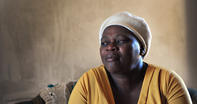Told her Daughter Won't Survive
The police came for her on Tuesday, just before Easter, in 2011. That was the weekend her angel died. They pulled up outside the grey-green Reconstruction and Development Programme (RDP) semi, with its house number – 14005 – painted on by hand in a watered-down rust colour, just to the left of the front door.

The reddish paint had wept rivulets down the wall beneath the inside curve of the number 5’s pot belly, before it dried. They came to Linah Ncani’s house on the edge of Witsand, near the Cape’s factory enclave of Atlantis, on that Tuesday. Your daughter is sick, they said. There is an ambulance on its way, they told her.
Come! The 52-year-old perches roundly on the edge of her couch, bands of copper sparkling from her upper eyelids with each blink. Dark liner underscores her rich brown eyes that are sadder, now, than last time she shared her story, a year ago. Since then, she has lost everything.
‘I said, “Please sweetie, talk to your mum”, and she said, “I’ll be alright mum”.’ In the ambulance, Linah scooped her youngest daughter to her chest and held her until they got to casualty. ‘I won’t leave you until the doctors have decided,’ she promised her daughter. But the news, when it came, was not good. Linah remembers how the ER doctor put it: ‘Meningitis differs and with this one, she won’t survive.’ But Linah said, ‘No, God will save her.’
Lost to Meningitis
Linah’s eyes squeeze shut. Crystals bloom along her short lashes. One, on the very edge, breaks free and trickles down over the curve of her cheekbone, painting her skin with a brush stroke of glistening wet. ‘Vuvu was hungry. But at the time I had no money.
There was a lady there who got a banana and she gave it to me for her.’ Linah wanted to get some more food for her, but before she left, she comforted her Vuvu. ‘I told her, “My sweetheart, I miss your smile, can you smile for your mum?” And she smiled and said, “I miss you too, mum”.’ These were the last words the two were to share. When Linah got back with fruit which she bought with R100 given to her by an acquaintance she bumped into in the hospital, Vuyo had been intubated.
Then it was to Groote Schuur for more brain tests. By Good Friday, she had been moved to Somerset Hospital in Green Point. By that afternoon, the security said her visitors could come through any time, they did not need to stick to visiting hours. Not a breaking of the rules you really wish for. Linah stayed. The following morning, she asked for clean sheets.
She remade the bed around her falling angel. Then she washed her. That night, she slept next to Vuvu, the rattling cadence of the ventilator offering a strange comfort. Bbbbphphph, bbbbphphph, bbbbphphph, bbbbphphph. And then, nothing. ‘Then I hear no more noise. And I think she is just sleeping. Then I look again and I see, no, she’s gone.’ Linah’s head turns away, eyes clinching again. Her lips suck inward, drawing a plump, tight line across her face as she tries to crush a departing sob.
‘I prayed, I talked to God, “Please God, why?”’ Twenty six year old Noluvuyo, the one who loved everyone, and who everyone loved, was gone. ‘You can have seven children,’ Linah says, ‘but only one will look after you. She was my angel. She was my everything.’
The loss of her daughter so unexpectedly to meningitis is still fresh and raw. What parent ever recovers after having the fabric of their universe ripped apart like this? But somehow Linah’s heart is big enough. She has been able to keep on with the care work she has been doing in her community for years, giving people the same swaddling love she gave to her gravely ill daughter. Linah spends her time working with the HIV positive.
Hoping for a Place in Heaven
The Christian god is a big feature in this community’s stand-off with HIV. Each volunteer meeting of the Atlantis Integrated HIV/AIDS Network starts with some kind of devotion. The group’s charter entreaties volunteers to spread the message that people with HIV need to be regarded with compassion and love.
Do not judge them. We are all broken people. And for the terminally ill, there is the hope that there might, indeed, be a house waiting for them in heaven. In the end, that is what Linah is hoping for – a place on the other side where she will find her Vuyo waiting for her. ‘I remember when I gave birth to her, I was in between, I was about to die.
It was a problem birth and the doctor said it may either be the mother or the child that will die.’ Her voice is faint, and rings slightly hollow. ‘But God saved both of us.’ She softens, crossing her arms up over her chest as if she is hugging the memory of the infant Noluvuyo to her nearly three- decades-older bosom.
But this time the beautiful girl really is gone. For Linah, her daughter somehow still seems present, though. She speaks about her in the first person, and even talks to her when she is pottering about the house. ‘I love her.
I feel like she is still here.’ She looks around the room, still inhabited by the woman smiling from inside the edges of a picture frame on the television cabinet that dominates one wall of the lounge. Noluvuyo: now, forever, 26. ‘No, I’m okay,’ says Linah from somewhere within the midst of a reverie that is still haunted by her daughter. ‘I must let her go.’
By Leonie Joubert